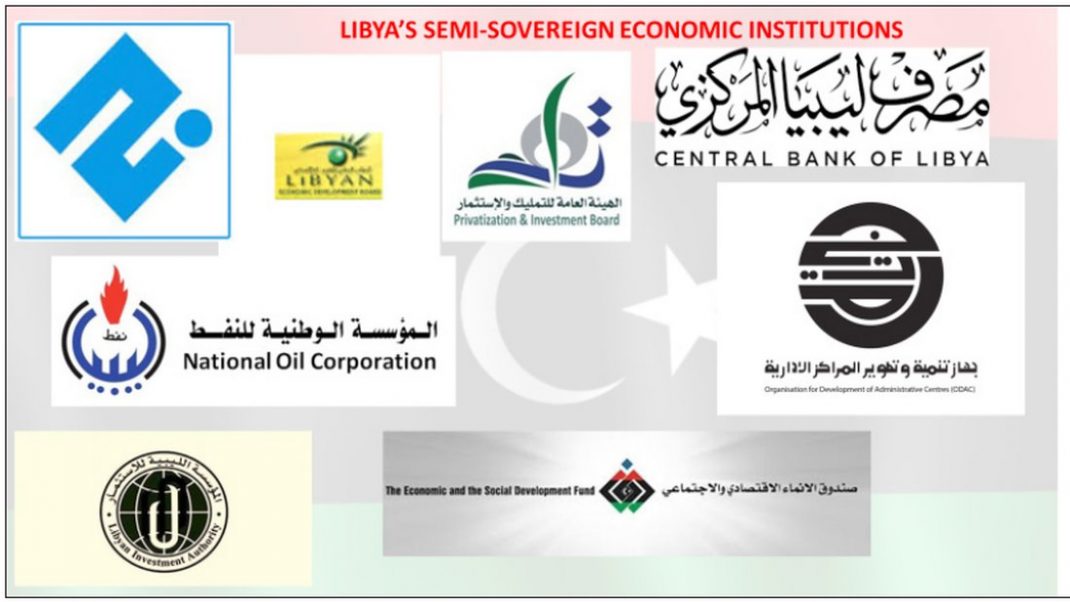How Libya’s Civil War Is Rooted in Its Economic Structures
By Jason Pack
 Istituto Affari Internazionali (IAI) releases Jason Pack’s overarching meta-analysis of the uniqueness (and unique dysfunctionality) of the Libyan economy.
Istituto Affari Internazionali (IAI) releases Jason Pack’s overarching meta-analysis of the uniqueness (and unique dysfunctionality) of the Libyan economy.
This analysis claims that the root of the country’s stymied transition and its post-2014 civil war is primarily economic – not political or ideological.
PART FIVE
5. What the international community can do
Ultimately, Libya needs to demobilise militias and decrease their stranglehold on the politics of the semi-sovereign institutions. The only way to do so is to weaken the incentives to be in a militia and the power that the militias exert over national life.
This in turn requires the reduction/elimination of subsidies and devaluation/floatation of the dinar as the smuggling and letters of credit fraud that subsidies and the dinar gap engender are the key structural incentives that promote militia power.
The requisite economic reforms cannot be conceived or implemented without a comprehensive understanding of the power relationships and competencies of the various institutions of the Libyan economy.
Therefore, fostering transparency and developing a comprehensive blueprint of the Libyan economy must be the first step forward.
The international community and the successive post-Qadhafi Libyan governments have for too long been trying to propose and implement action plans without many of the relevant facts or access to the real levers of power.
The first step is to commission a structural, legal and historical mapping of the Libyan economy conducted by a majority Libyan team with ample oversight, input and project management from international academics, retired diplomats and subject matter experts from the business community.
The research team should not be the run of the mill GIZ, DFID, or USAID exercise which is subcontracted to an implementing partner which in turn employs development contractors, NGO professionals, security personnel and translators.
What is needed is the top 20–40 global and Libyan experts.
Only this group have the requisite skills: bilingualism, ability to move in and out of Libya, and the background acquired from having dedicated decades of their lives to studying and working on the Libyan economy.
This is a very small cadre with divergent views and loyalties: if chosen correctly the findings of the research team, will not be precooked but the outcome of genuine research, debates and compromises.
The research team should be mandated by the UN (but still sit outside that body and not be governed by its bureaucratic hiring procedures), funded by major international players, and comprised of those leading Libyan youth activists, technocrats, civil society figures, international academics, retired diplomats, active policymakers and analysts who have dedicated their lives to understanding the Libyan economy.
Once the team is created, it will be politically difficult for Libyan political authorities on all sides and semi-sovereign institutional heads not to all pledge complete access and openness of their staffs, records and offices.
The research team should compile three reports: a first one on the Libyan economy as it was during the Qadhafi period, a second on how it is now, and a third based on a survey of Libyans across the nation as to how they would like it to be.
In each case, they must compile the relevant laws and competencies that govern the interrelationships of its parts.
This should then be combined with a professional forensic audit not only of the CBL, but of the all of Libya’s semi-sovereign economic entities as well as all of the ministries.
This forensic audit of the CBL has been agreed as part of the LNA’s price for being willing to cooperate with the NOC and CBL, but the big four accounting firms (EY, Deloitte, KPMG and PwC) all refused to bid on the project.
It is also not known if sufficient access will be given to the successful bidder. As this paper goes to press, the forensic audit is being delayed based on the lack of a suitable international bidder.
Western governments must incentivise neutral and competent firms to undertake the project and demand all of the other semi-sovereigns to pledge the openness of their institutions, and follow suit and commission forensic audits.
The multiple institutional forensic audits should be combined with the three reports of the Committee of experts. Together they can be used to create a map of how the Libyan economy works, where the money is, where the bottlenecks are, their historic origins, where the inefficiencies and corruption lies and what can be done to fix them in line with the will of the Libyan people.
All this information must be published in English and Arabic on a website where Libyans and international players can access it and a moderated discussion can evolve in real time.
A skilled and multilingual communications department must promulgate this information to the Libyan people as it is being generated.
Merely getting this information out there would formulate the basis for a national conversation about the future of Libya.
Conclusions and the way forward
The Libyan population is smart, curious and patriotic. Attempts at a national dialogue concerning a constitution or political power-sharing in Libya have, heretofore, failed because they do not touch the root of the problem that matters to Libyan’s daily lives.
Borrowing the phrase from the US 1992 presidential campaign of Bill Clinton, “it’s the economy, stupid”.
Without economic transparency, no high-level diplomacy or bottom-up national dialogue can fix Libya. The root-causes of the ongoing civil war are not political or military.
They are economic. The time for bold, but inexpensive action, is now. Constituting a research team for a mapping exercise and commissioning forensic audits should be politically palatable to all Libyan factions and all major international players.
After witnessing years of inaction, the UN is finally prioritising economics. The UN Support Mission in Libya (UNSMIL) has hired a chief economist.
In his July speech to the UN Security Council, UN Special Envoy Ghassan Salamé said, “Robust efforts will also be required to combat the smuggling of people, fuel, weapons and drugs – sources of wealth for the armed groups and associated criminal elements.
Measures must also be taken to combat the rampant corruption which has infested almost all elements of the state.”
At present, UNSMIL lacks the requisite leverage. Partially, this is because the heads of certain semi-sovereign Libyan economic institutions remain unwilling to collaborate.
UNSMIL treats them as independent sovereigns over which it has no legal authority. UNSMIL should reverse this precedent and urgently declare their semi-sovereign status and work with the relevant Libyan authorities to pressure those who stand in the way of reforms, transparency, and the work of the audits and research team.
Partially, UNSMIL’s lack of leverage is structural. It has a small team, with limited research capacity, limited access to finances, governed by a range of bureaucratic rules.
Its employees do their best given the restrictions within which they operate.
But asking the thirty core UNSMIL staff (very few of whom are true country specialists and none of whom are forensic accountants) to first categorise and then fix Libya, is unfair, especially when major Western and regional powers have
the ability to deploy the technical experts and, more crucially, the money to do the job.
UNSMIL needs more than the verbal support of major member states. It needs the muscle, treasure and legal power of the member states brought to bear on the Libyan quagmire.
It makes sense to start small with an “easy win”. The research team of experts combined with audits is such an approach.
In summation, this paper 50 has barely scratched the surface of the convoluted Libyan economy, a subject about which so little is genuinely known.
It has illustrated certain salient complexities of Libya’s economic structures and why they will remain an implacable impediment to peace building unless the light of transparency penetrates the dark abyss of Libya’s semi-sovereign economic institutions.
Given the above complexities and inefficiencies, logically, transparency must be front and centre of any international approach to mediate Libya’s civil war.
Previous international efforts have either ignored the issue or like the Skhirat Agreement have added further opacity and contradictions.
This logical argument that the opacity of Libya’s semi-sovereign economic institutions are at the root of Libya’s civil war and that transparency is the first step of the solution constitutes a clear and holistic approach to the Libyan crisis for the international community
and UNSMIL to follow.
***
Acknowledgements
This paper derives from a talk I gave in a committee room of the UK House of Commons on 5 September 2018 to members of the Conservative Middle East Council and the Libyan British Business Council.
It is also the product of more than a decade of work experience and reflection.
Struggling to understand an opaque economy – whose deliberate complexities were created to obfuscate – requires a lot of inspiration, mentorship, fellowship, and exchange of ideas.
I am particularly grateful to my colleagues and friends in the US and UK who have helped me contextualise the Libyan economy and its idiosyncrasies: Chuck Dittrich, David Mack, Karim Mezran, Jonathan Winer, Rhiannon Smith, Richard Northern, Sir Vincent Fean, Mary Fitzgerald and Peter Millett.
As for my Libyan colleagues who continue to work at the upper echelons of Libya’s economic institutions and have shared their experiences and perspectives, Faysal Gergab, Sadek al-Kabir, Tarik Youssef al-Magariaf and Mustafa Sanallah have all been incredibly generous with their time and insights.
Nate Mason is not only the expert on the extent and implications of the “dead paper” problem latent in the Libyan economy, but he conceptualised the distinction between Qadhafian “semi-independent”, as opposed to post-Qadhafian “semi-sovereign”, economic institutions. Much of the strength of my core argument rests on this distinction.
This paper has been immensely improved by Jonathan Dart, Tim Eaton and Stephen MacSearraigh who each added their own clever turns of phrase, while pushing back firmly against the politically less palatable policy suggestions I initially formulated.
It goes without saying that all errors in the manuscript are my responsibility alone, and when dealing with such a complex topic as the Libyan economy, I apologise in advance as I am sure there are quite a few.
Lastly, Abdul-Rahman al-Ageli first opened my eyes to the deeper structures of the Libyan economy. Ahmed Jehani explained to me the insidious way in which the weight of the Qadhafian legacy currently prevents economic reform.
They have both dedicated their lives to trying to promoting a transparency-based economic solution to the problems that ail Libya.
Yet it is to Hamam Elfassi that this paper is dedicated. Your insights and intellectual companionship over the years have opened up to me the inner world of the Libyan economy.
Our joint struggle for truth and justice may not ultimately change the world, but at least it has brought us true friendship.
The End
***
Jason Pack is the founder of the consultancy Libya-Analysis and was previously the executive director of the U.S.-Libya Business Association.
***
The Istituto Affari Internazionali (IAI) is a private, independent non-profit think tank, founded in 1965 on the initiative of Altiero Spinelli. IAI seeks to promote awareness of international politics and to contribute to the advancement of European integration and multilateral cooperation.
____________





